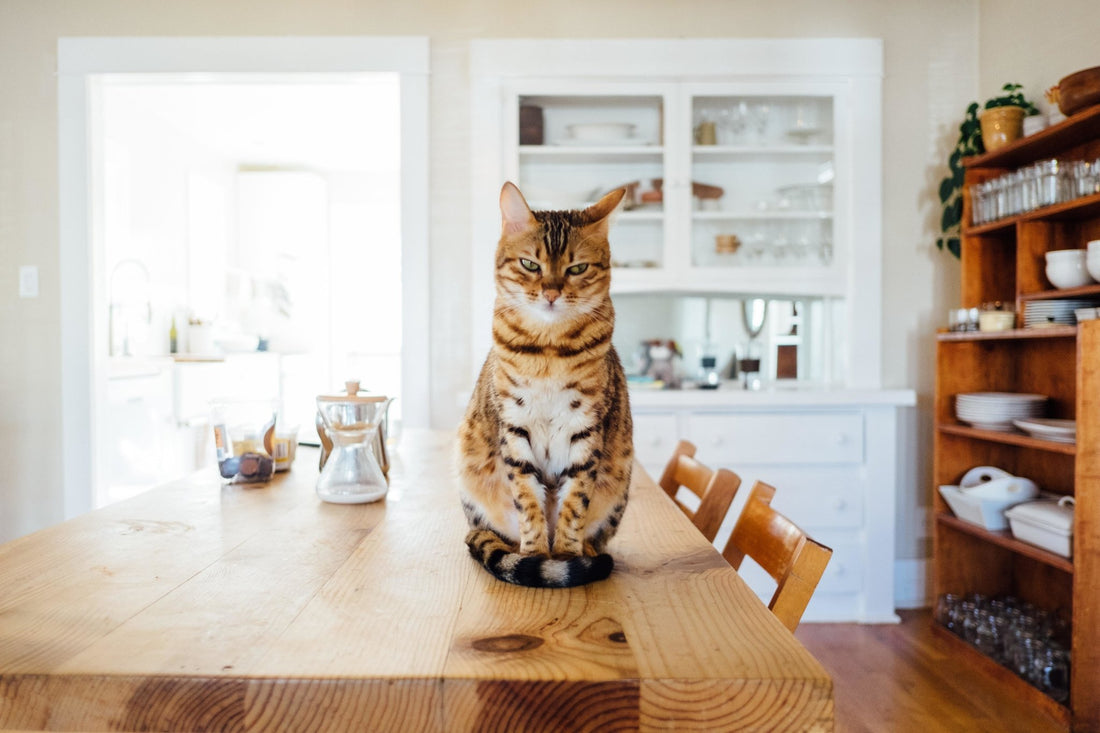
6 Health Concerns To Watch For In Your Cat
Share
Even the healthiest of cats can develop a medical problem. Things can happen suddenly or slowly as they age. Thankfully, most conditions are easily treated and are nothing to get overly concerned about.
Unfortunately, there are certain diseases that cats are more prone to. Knowing what these are, and the most common symptoms, will help you spot them quickly. As a responsible pet parent, it’s important to stay observant because even the most serious illnesses can be treatable if caught early on!
Here we’ll discuss 6 of the most common ailments in cats and how to spot the symptoms. Make sure to save this list as a reference so that you know what to look out for long term.

6 of The Most Common Feline Health Concerns
Let’s dive into the 6 most common feline health concerns, their symptoms, and what you need to know about them.
1. Feline Urinary Tract Disease
Feline Urinary Tract Disease, which is often shortened to FLUTD, is a bit of a catch-all term. It refers to a group of diseases that can affect the feline urinary tract. It can be caused by stress, a blockage in the urethra, or bacterial infection. If you think your cat may have a urinary infection, get it diagnosed as quickly as possible. Urinary tract conditions can turn very dangerous quickly.
Symptoms include:
- Straining
- Blood in the urine
- Vocalizing while urinating
- Compulsively licking their rear area
- Vomiting
- Drinking more water than usual
- Dehydration
- Lack of appetite
- Urinating outside of their litter box
- Lack of urination
2. Dental Disease
Also known as periodontal disease, dental disease is caused by a build-up of bacteria that causes brown plaque on their teeth. Plaque isn’t just unattractive, it causes bad breath, the slow breakdown of your cat’s teeth, and it can eventually lead to gum infections. Dental disease can even lead to heart problems and systemic infections if ignored for too long. Signs of dental disease are:
- Bad breath
- Discolored teeth
- Bleeding gums
- Excessive salivating
- Difficulty eating
- Pawing at the mouth
- Weight loss
3. Fleas
Fleas are the bane of every pet owner’s existence. Once they’ve established themselves on your cat, they’re darn near impossible to get rid of. Besides the constant itching, irritation, possible allergies, and creepy bloodsuckers that are now crawling all over your house, fleas come with extra problems. A flea infestation can cause your cat to develop anemia. Fleas also carry parasites, which means that while chewing to relieve the itch, your cat could ingest a flea and end up with a parasite like tapeworms. Stop a flea infestation before it gets out of hand by watching for:
- Excessive scratching
- Flea dirt (black flecks that turn red when wet)
- Licking
- Patchy hair loss
- Inflamed skin
4. FIV
FIV (Feline Immunodeficiency Virus) is the most common infection in cats worldwide. It is a retrovirus that attacks the immune system, making it easier for other illnesses to develop in your cat’s body. FIV used to be considered a death sentence for cats, but there are treatment options now that can help prevent your cat from catching opportunistic infections and help them live long, healthy lives. Some FIV symptoms can mimic other illnesses or cause secondary problems like:
- Runny nose
- Fever
- Discharge from eyes
- Swollen lymph nodes
- Sneezing
- Persistent diarrhea
- Loss of appetite
5. Kidney Disease
Urinary tract problems are a frequent occurrence in cats, and this includes the kidneys. Kidney disease is diagnosed when 75% of a cat’s kidney tissue has stopped functioning properly. Since the kidney's function is to filter waste products from the blood, this can have serious consequences. It is most common in cats over 7 years old but can occur in cats of all ages. It can be caused by ingesting toxins, infectious diseases, and infections spreading from the lower urinary tract. Unfortunately, kidney disease is irreversible, but it can be treated up until its very latest stages. Fluids, vitamin injections, supplements to manage potassium levels, and electrolytes are all part of treatment. If you are worried your cat may have kidney problems, watch for:
- Bad breath
- Dehydration
- Weight loss
- Weakness
- Vomiting
- Frequent urination
- Ataxia, sunken eyes, seizures (these are seen in the late stages of kidney disease)
6. Obesity
“Chonky'' cats are pretty dang adorable, and the internet agrees. Unfortunately, a cat with too much extra “cuteness” is at risk for all kinds of complications. 35% of the cats in the US are obese, with 50% of cats from 5-11 years old being considered overweight. This means a large number of cats are at least 20% over their ideal healthy body weight. You can tell just from looking if a cat is overweight or obese. What you can’t see are all of the conditions that the cat is now at risk for including:
- Diabetes
- Arthritis
- Bladder stones
- Hepatic lipidosis
- Kidney disease
Make sure to talk to your veterinarian about the best options for treatment for your cat. Your veterinarian knows your cat best and can guide you in the right direction.
If you are looking for natural options to help ease your cat’s discomfort and promote their overall wellbeing, we have a variety of products in our shop at Homescape Pets.
Our Calming Relief Oil, for example, may help ease any discomfort and help maintain a normal inflammatory response. The oil is composed of turmeric which is a natural anti-inflammatory and has antibiotic and anti-fungal properties. Calming Relief Oil has been used by a variety of cats suffering from things like dermatitis due to fleas, urinary tract infections, inflammation from dental disease, and/or stomach discomfort.
CBD oil can help with immune support and stimulate appetite in animals who are suffering from an illness. Plus, it may also help ease any discomfort. That’s why Companion’s Best Day is the perfect option to support overall wellness, calmness, a healthy immune system, and cognitive health.
Again, always consult with your veterinarian before starting your cat on a new supplement regimen. Every cat is unique, so they will not all react the same way to supplements, but you can rest assured that our products are made for animal use and are safe for your cat.
